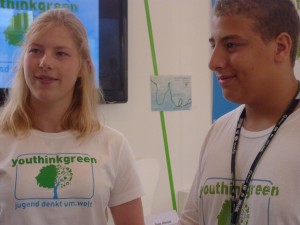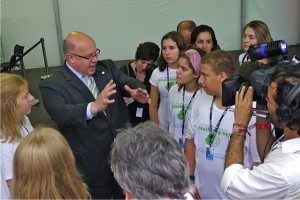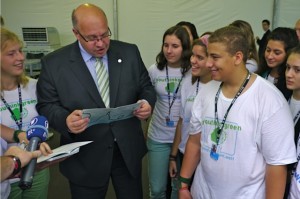Search Results for Tag: United Nations
Water blog Part III – An ocean full of solutions?
In the third and final part of our blog series on water, Julian Claudi looks at initiatives, small and big, around the world that try to tackle the water crisis by advocating more sustainable and efficient uses of water but also various techniques to obtain clean water.
Let’s listen to Vandana Shiva, Indian physicist, environmental activist, recipient of the Right Livelihood Award (the ‘Alternative Nobel Prize’) and author of the book “Water Wars” summing up the problem of the water crisis in India and how it echoes the global water crisis. Shiva addresses both – communities and water companies:
So, for India – and the world – what are the ways out?
“Governments must make a concerted effort to invest inimproving water infrastructure and management […] We must also engage communities, the private sector and civil society in promoting water conservation and water reuse.”
This is Noeleen Heyzer, Executive Secretary of United Nations Economic and Social Commission for Asia and the Pacific (ESCAP), in her speech at the 2010 Asia-Pacific Water Ministers’ forum. She called for
“…the use of simple technologies such as drip agriculture, climate appropriate cropping, rainwater harvesting and grey water reuse [which] can go a long way in increasing our water eco-efficiency.”
But can the world wait for governments to finally start doing “the job” more comprehensively?
It looks like a global solution may be some way off, yet. But there are plenty of grassroots initiatives. Barefoot College in India is an example.
The Barefoot College experts are employing an impressive range of different techniques to obtain clean water: Rain water harvesting (RWH) tanks, dams, solar powered reverse osmosis (R/O) water desalination plants, wells and ponds for ground water recharge obtain clean water.
Some of these work well at a local level, but may not be feasible on large scales. In the case of reverse osmosis (R/O) water desalination plants, it would raise serious concerns:
claims Food & Water Watch, a the Washington, D.C.-based consumer rights NGO, in a special report on reverse osmosis/water desalination:
“Ocean desalination ignores the fact that the water shortages […] are not due to a lack of natural water resources, but rather to shortsighted water policy that focuses on finding new water resources instead of managing existing resources wisely.”
But more sustainable solutions may be facing an uphill struggle. Large-scale desalination is projected to become a highly traded commodity on global markets soon.
“Depleting water supplies, coupled with increasing water demand, are driving the global market for desalination technology, which is expected to reach $52.4 billion by 2020, up 320.3% from $12.5 billion in 2010.“
But even if the trading floors love desalination, the Pacific Institute, an US non-profit research institute, adds that
It recommends that
Even wastewater recycling doesn’t appear to be entirely free of side effects, as Vivian Futran, Project Manager and PhD Student at Ben Gurion University in Israel points out here:
“For example, the types of sewage treatment used historically may not remove all micro-contaminantsincluding endocrine disrupting compounds (EDCs), a class of chemicals that can affect human development and reproductive functions.”
She concludes that
“Wastewater recycling is a relatively young technology that, while helping tackle some obvious water-related problems in Israel and elsewhere, may present dangers which still have not been fully characterized.”
Sounds like more research needs to be done. But here’s another, and encouraging example:
“Countries in the Middle East, such as Israel, and Jordan, have already transformed their agriculture [with this system] “, said Stravato. But in the Sahel, drip irrigation, which is almost a minor revolution, is only just getting going.”
Another idea is to collect fog to harvest freshwater from it – a technique that requires no on-going energy input and is considered to have a positive outcome also in connection with reforestation. Have a look at some promising projects here:
Meanwhile, “Citizen Matters” an independent local collaborative online magazine in Bangalore, India’s third most populous city, reminds us that it is vital to be careful with existing water reservoirs. For instance, aquifers – soil layers holding water – should be replenished by rainwater harvesting (RWH) and must not be permanently exploited:
“We need to replenish this water as it is finite and the best method found so far is RWH. Just digging a borewe- well and exploiting all the water is an uneducated move. Use all in your power to replenish the water table mainly with RWH and this can help maintain a good source of clean and fresh water, with the future in mind. ”
A good example to close our blog series. We hope we could shed some light on the complex issue of the global water crisis and the initiatives to address it. Everywhere something can be done on various levels to improve the situation and to make sure the right to clean and fresh water for everyone doesn’t remain a theory.
Beach party in the desert
Author: Kerstin Schnatz
They are infamous, a great way to meet new people and loved even by state delegates: The parties of civil society groups during the yearly climate summits.
This year’s party took place on a beach in the middle of the desert, about an hour’s drive away from Doha. We went there to soak up the atmosphere as well as for some late night networking.
Minister receives green bracelet

Ahmed together with one of his fellow climate ambassadors from Youthinkgreen.
Author: Kerstin Schnatz
Ahmed’s big eyes are beaming with pride. The young Egyptian is standing on the stage of the German Pavillon in Rio de Janeiro. The 16 year old pupil has started a recycling project at Kairo’s German school which he is presenting to an international audience today at the Rio+20 conference.
“Be the change you want to see in the world“
While politicians are negotiating the final document of the United Nations Conference on Sustainable Development just across the street, Ahmed wants to take action: „In Egypt no one separates their rubbish. Plastic, paper, food waste – everything goes into one bin.”
Triggered by the German initiative Youthinkgreen, the couragious teenager and his classmates set up a plastic recycling scheme at their school. The green initiative is supported by chancelor Angela Merkel and has reached over 200 young people in over ten countries so far. Some of them have come to the Rio+20 summit to present their local projects.
Change does not come easily
“A recycling company to pick up the plastic waste was found very easily.“ Ahmed reflects on his own initiative back home. “But after a few weeks, the garbage man told me that he would stop picking up our bin. It was flooding over with a variety of food scraps, paper and aluminium cans.” To get everyone at school to separate their rubbish correctly, a rota was set up. When asked how he made his classmates do the smelly job, Ahmed laughs: „At the beginning no one wanted to bring down the odd rubbish bin. Now you get a bag of sweets, so my friends sometimes even fight over it.”

Peter Altmaier and the Youthinkgreen crowd at the Rio+20 summit.
Handshake with a Minister
After the presentation, Ahmed even gets a chance to meet the German Environment Minister Peter Altmaier. Together with his friends from the Youthinkgreen crew, the young man has managed to sneak into Hall 4 – a restricted area and normally reserved for state and United Nations delegates only. But Ahmed keeps his cool and steps up right next to Altmaier: „We have come to bind a green bracelet to your wrist!“ Ahmed and his friends hope that through this little gesture the politician will be reminded of young people’s longing for a greener future.
Altmaier who just turned 54 two days before, laughs heartily and stresses how important it is that young people take action. The Minister takes his time, listens patiently to everything the youngsters tell him. “Please visit Egypt and help us to put up more solar panels.“ Before the journalists can push in to fire their questions at the Minister, Ahmed has grabbed the opportunity to speak up again. Altmaier says that he wishes all the best for Egypt but that he unfortunately can not be in every country at the same time but will remember this meeting. Then he turns around to talk into the television cameras.

At the Rio+20 congress, teenagers from Youthinkgreen handed over green bracelets and a position paper to politicians and scientists from around the world.
“Far less than we know is needed”
What should the delegates at the Rio+20 summit agree on? What will the outcome most likely look like? That’s what we asked visitors of the UN conference. The United Nations Conference on Sustainable Development is going to end on Friday.
A stronger UNEP: Almost off the table?
Author: Kerstin Schnatz
How can we better tackle global environmental problems – such as the loss of biodiversity or air pollution? Many countries believe that the United Nations should have a bigger say in solving these problems – one of the most controversial issues at the Earth Summit at Rio de Janeiro, where over 115 world leaders come together to discuss global challenges.
The European Union for example favors an „upgrade“ of the United Nations Environmental Programme (UNEP) to the same level as more powerful UN bodies, such as the Food and Agriculture Organisation or the World Health Organisation.
But other nations are opposed to this change – including Brazil, host of the summit. According to non governmental organizations watching the Rio+20 negotiations closely, a full scale upgrade of UNEP is by now almost off the table.
German Environment Minister Peter Altmaier sticks to the European position:












Feedback